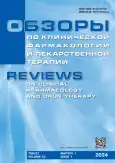Probiotics: Review of the current state of the problem from the standpoint of clinical pharmacology and evidence-based medicine
- Authors: Pavlysh A.V.1, Galunova T.Y.2, Kachanov D.A.1, Lapkina G.Y.1
-
Affiliations:
- North-Western State Medical University named after I.I. Mechnikov
- N.N. Petrov National Medical Research Centre of Oncology
- Issue: Vol 22, No 1 (2024)
- Pages: 97-105
- Section: Clinical pharmacology
- Submitted: 08.03.2023
- Accepted: 28.02.2024
- Published: 27.04.2024
- URL: https://journals.eco-vector.com/RCF/article/view/321186
- DOI: https://doi.org/10.17816/RCF321186
- ID: 321186
Cite item
Abstract
The use of antibiotics in the treatment of various diseases dramatically changes the quantitative and qualitative compositions of both pathogenic and symbiotic microbiota. Oral and parenteral use of antibacterial drugs affects and changes the quantitative and qualitative compositions of the intestinal microbiota, which subsequently entails changes in the cell development and long-term violations of physiology at all levels of functioning of the macroorganism. This study analyzed available data on modern probiotic drugs, which help improve the normal microbiota in the human body. The results revealed the undoubted effectiveness of various probiotics in acute and antibiotic-associated diarrhea and eradication of Helicobacter pylori.
Full Text
About the authors
Andrey V. Pavlysh
North-Western State Medical University named after I.I. Mechnikov
Email: andrei.pavlysh@szgmu.ru
ORCID iD: 0000-0002-7617-5822
SPIN-code: 5785-8324
MD, Dr. Sci. (Medicine)
Russian Federation, Saint PetersburgTatiana Yu. Galunova
N.N. Petrov National Medical Research Centre of Oncology
Email: galunovaeyu@mail.ru
ORCID iD: 0000-0002-4588-6496
SPIN-code: 3244-5406
Russian Federation, Saint Petersburg
Dmitrii A. Kachanov
North-Western State Medical University named after I.I. Mechnikov
Author for correspondence.
Email: Dmitrii.Kachanov@szgmu.ru
ORCID iD: 0000-0003-1528-1899
SPIN-code: 4912-7511
Russian Federation, Saint Petersburg
Galina Ya. Lapkina
North-Western State Medical University named after I.I. Mechnikov
Email: Galina.Lapkina@szgmu.ru
SPIN-code: 4967-2337
канд. мед. наук
Russian Federation, Saint PetersburgReferences
- Kaibysheva VO, Nikonov EL. Probiotics from the standpoint of evidence-based medicine. Russian Journal of Evidence-Based Gastroenterology. 2019;8(3):45–54. EDN: LFBVJW doi: 10.17116/dokgastro2019803145
- Suez J, Zmora N, Segal E, Elinav E. The pros, cons, and many unknowns of probiotics. Nat Med. 2019;25(5):716–729. doi: 10.1038/s41591-019-0439-x
- Kim SK, Guevarra RB, Kim YT, et al. Role of probiotics in human gut microbiome-associated diseases. J Microbiol Biotechnol. 2019;29(9):1335–1340. doi: 10.4014/jmb.1906.06064
- Piqué N, Berlanga M, Miñana-Galbis D. Health benefits of heat-killed (tyndallized) probiotics: an overview. Int J Mol Sci. 2019;20(10):2534. doi: 10.3390/ijms20102534
- Tkachenko EI, Skazkavaeva EV, Avalueva EB, Sitkin SI. Saccharomyces boulardii (Enterol®) in the practice of the therapist and gastroenterologist. Gastroenterologiya Sankt-Peterburga. 2010;(1):23–24. EDN: YMCEJA (In Russ.)
- Feizizadeh S, Salehi-Abargouei A, Akbari V. Efficacy and safety of Saccharomyces boulardii for acute diarrhea. Pediatrics. 2014;134(1): e176–e191. doi: 10.1542/peds.2013-3950
- Hojsak I, Fabiano V, Pop TL, et al. Guidance on the use of probiotics in clinical practice in children with selected clinical conditions and in specific vulnerable groups. Acta Paediatr. 2018;107(6):927–937. doi: 10.1111/apa.14270
- Stetsiouk ОU, Andreeva IV. The evidence base and practical approaches to probiotic use in clinical practice: a focus on Lactobacillus rhamnosus GG and Bifidobacterium lactis Вb-12. Clinical Microbiology and Antimicrobial Chemotherapy. 2019;21(2):100–118. EDN: QVNQAE doi: 10.36488/cmac.2019.2.100-118
- Ruchkina IN, Fadeeva NA. The role of a combined probiotic in the treatment of lactase deficiency. Terapevticheskii Arkhiv. 2021;93(4): 431–434. EDN: YOITWO doi: 10.26442/00403660.2021.04.200808
- Sugyan NG, Zakharova IN. Bac-Set multiprobiotic: results of Russian and foreign clinical research. Medical Council. 2017;(19): 104–110. EDN: ZQTKXL doi: 10.21518/2079-701X-2017-19-104-110
- Ushkalova EA. Current views on the role of probiotics in the prevention and treatment of different diseases: Focus on Linex. Terapevticheskii Arkhiv. 2014;86(4):117–124. EDN: SVPGZJ
- Kornienko EA, Saburova AV. The experience of using l. Acidophilus probiotic in the complex therapy of gastroduodenitis with the syndrome of excessive bacterial growth. Children Infections. 2018;17(3):46–50. EDN: XYUJPF doi: 10.22627/2072-8107-2018-17-3-46-50
- Ushkalova EA, Gushchina YuSh. Linex forte in the prevention and treatment of gastrointestinal diseases. Terapevticheskii Arkhiv. 2015;(12): 138–144. EDN: VKWGVJ doi: 10.17116/terarkh20158712138-144
- Videlock EJ, Cremonini F. Meta-analysis: probiotics in antibiotic-associated diarrhoea. Aliment Pharmacol Ther. 2012;35(12): 1355–1369. doi: 10.1111/j.1365-2036.2012.05104.x
- Saturio S, Nogacka AM, Alvarado-Jasso GM, et al. Role of Bifidobacteria on infant health. Microorganisms. 2021;9(12):2415. doi: 10.3390/microorganisms9122415
- Kazemi A, Noorbala AA, Azam K, et al. Effect of probiotic and prebiotic vs placebo on psychological outcomes in patients with major depressive disorder: A randomized clinical trial. Clin Nutr. 2019;38(2):522–528. doi: 10.1016/j.clnu.2018.04.010







